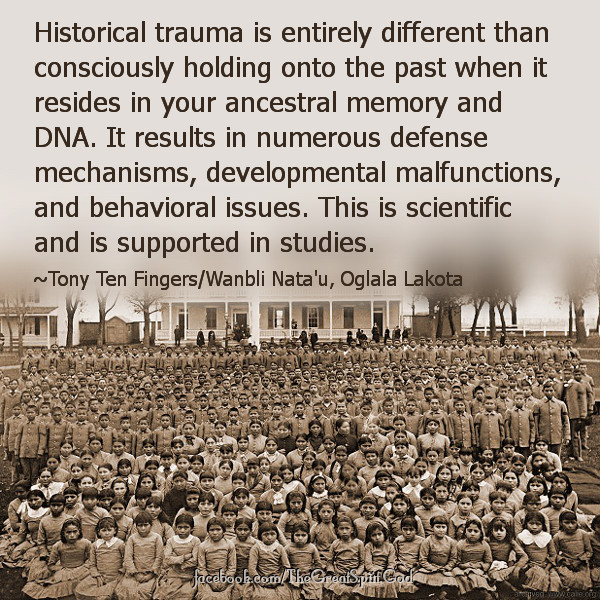Many present-day health disparities can be traced back through epigenetics to a colonial health deficit, the result of colonization and its aftermath. Understanding the heritage of people, can go a long way to understanding how to serve them to achieve a better future. Understanding the inherited generational trauma of indigenous peoples is key to anyone seeking to work in developing regions, to understand how this debilitating pain can be transmuted into their strength.
Economic policy has to treat the inward causes in order to resolve the outward symptoms of economic development. To gain a deeper understanding of the application of neuroscience and mental health to resolving this ancestral trauma. Specifically how to work with indigenous tribes and rural peoples who have suffered systemic abuse for centuries, and how to heal old wounds with the wisdom needed to transmute their pain into a strength.
According to the research, high rates of addiction, suicide, mental illness, sexual violence and other ills among indigenous people are, at least in part, influenced by historical trauma, epigenetics. For a deeper dive, read the article on “Intergenerational Trauma: Understanding Natives Inherited Pain” by Mary Annette Pember.
What exactly is historical or intergenerational trauma? Michelle M. Sotero, University of Nevada offers a three-fold definition. In the initial phase, the dominant culture perpetrates mass trauma on a population in the form of colonialism, slavery, war or genocide. In the second phase the affected population shows physical and psychological symptoms in response to the trauma. In the final phase, the initial population passes these responses to trauma to subsequent generations, who in turn display similar symptoms.
In a 2008 study by Moshe Szyf at McGill University in Montreal that examined the brains of suicide victims. Szyf and his team found that genes governing stress response in the victim’s hippocampus had been methylated or switched off. Excessive trauma causes us to produce hormones called glucocorticoids which can alter gene expression.
Listening to and understanding the inherited generational trauma of indigenous peoples is key to anyone seeking to work in developing regions. It is natural that such cultures have a deep seated suspicion of western help which has previously inflicted such traumas, and now wishes to provide development or advanced solutions to their challenges, which often prove to be yet more forms of neo-colonial exploitation. Wealthy countries now extract 24-times their foreign aid spending in net outflows from developing regions, according to the GFI.
The GDP of emerging and developing economies is $33.52 Trillion (IMF.org). The truth is that these countries are often not poor and in need of saving, they are rich and in need of empowering. Corporations and Governments have just devised more intelligent ways of how to rob and exploit them. Indigenous people deserve an equitable share of their inheritance, an equitable share of their development. With the global rise of consciousness and transparency, we now see an end to this era of criminal exploitation, and a reversal that begins with healing ancestral wounds and sharing the wisdom needed to build regenerative economies.
We must listen, we must respect first and foremost the people’s culture and the sense of who they are in the face of such a traumatic history. They bear an inherited resilience which has held their people together, they are the ancestors of humanity whose knowledge has been transmitted for thousands of years, and often I have found that the leaders of these lands know the cry of their people, they know what they are waiting for and what they need.
Our development partner Dr. Ernesto Sirolli speaks in this vein with an inspiring talk on TED, or read Dead Aid by Dambisa Moyo, they are experts on what will work where so many have failed.
The Jewish people have an inherited generational trauma having passed through many genocides in the course of their existence, the trauma has altered their gene expression. They have had to innovate as a means of necessity and survival, and such is the life blood of their people, to innovate, to push new boundaries.
Their willingness and passion is the key driving force, they believe in a purpose greater than themselves and aspire to it. How can one take the traumas of the past and wield them into the strength of one’s future?
As Jews we constantly reminded ourselves that we survived no matter what we faced. Innovation requires that same mettle, that same spirit. The will to survive, the will to overcome. It is tapping into this priceless resource that tips the balance. How do you reach this precious reservoir of strength deep in the minds of indigenous people, how do you empower them to lift themselves our of poverty by their own will.
No man has the will to build if he believes it will be taken away. The rule of law must protect the rights of people to build for their future as fiercely as one protects the rights of sovereign states. Government must serve the people, and now the technology exists to decentralise that power into accountability to the people. The oppression of the masses for the sake of profit must end, one chooses liberation or one faces revolution. The poor and indigenous people of the world are being educated, and with that education comes an understanding that they have long been abused for the sake of profit. The trauma runs deep in our veins.
In the looting machine it sums up how Africa is being fleeced of her inheritance – in 2010, fuel and mineral exports from Africa were worth $333 Billion, more than seven times the value of the aid that went in the opposite direction, these numbers would be magnified by the vast sums stolen out of the country through corruption and tax evasion.
In 1967 my family was forced to leave Africa and nearly all the wealth we had built behind, at the time my grandfather had been the last President of the Jewish Community in Sudan. Our whole life suffered because of being robbed of our inheritance by dishonest government and partners. I found a kinship with Africans, I understood their pain, I understood what it was like to be conned out of one’s inheritance.
As such we developed a solution that would work for the people, that would build up their regions and distribute growth equitably. One that is rooted in their cultural heritage, yet provides the strength of our greatest advances in human civilisation.
I think underpinning this next ideological shift economically, is a search for meaning, authenticity and purpose. That is the heart centre of any great shift, it can’t be fabricated in a boardroom, it won’t emerge as a white paper, it has to be built on the ground, tried and tested, it has to shift the balance of power to make economically self-sufficient societies, it has to ride on the willingness and passion of the local spirit ready to rise from generations of trauma to embrace a new future.
One must consider epigenetics and whether a society’s ancestral trauma will lead it to a new stage of growth or stagnation.
Where is the next Rwanda that turned deep epigenetic trauma into wisdom and a vision for the nation. Where is the next to rise from generational trauma to become a civilisation of thriving communities in Africa. Karamoja is the engine of East Africa, a tribe split over four countries that is now emerging from a long famine. One needs a generational approach that will restore their dream as individuals to recognise their own purpose as part of a larger narrative.



